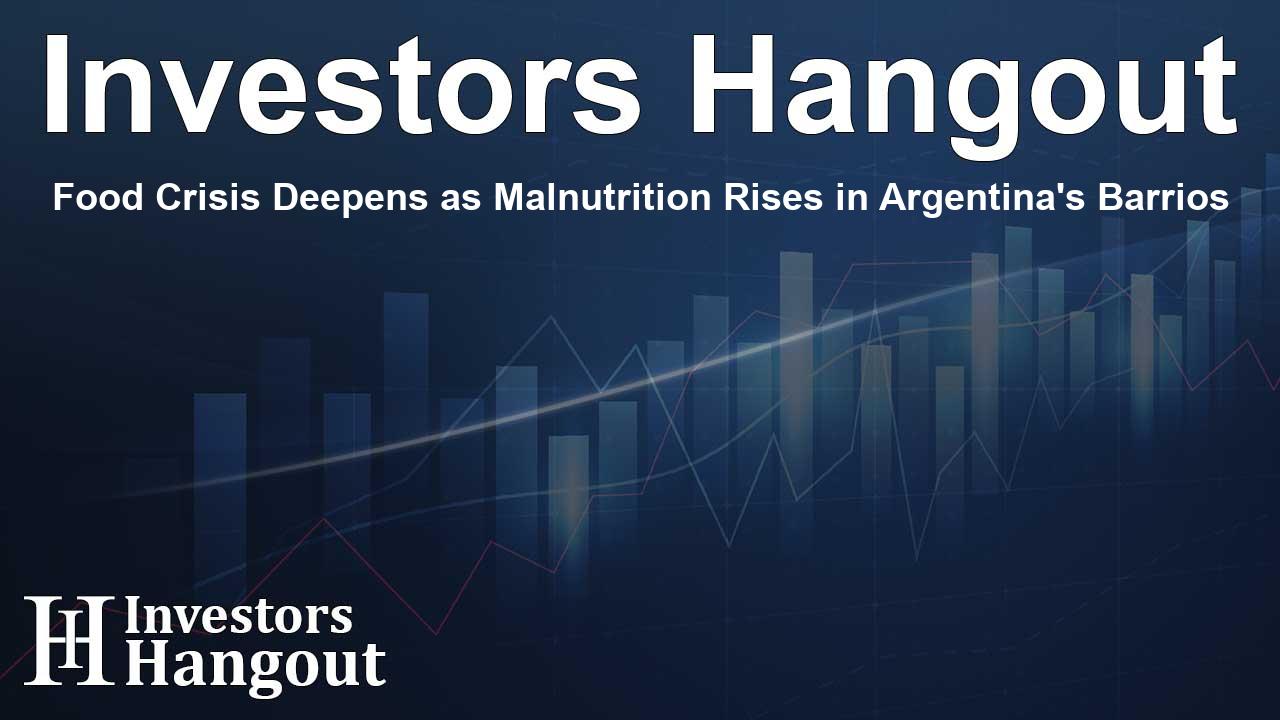Food Crisis Deepens as Malnutrition Rises in Argentina's Barrios

Food Emergency in Argentina's Underprivileged Areas
As Argentina struggles with rising poverty, a significant food emergency is unfolding in its poorer barrios. Access to nutritious food has become increasingly limited, with families feeling the brunt of malnutrition. Medical professionals are reporting alarming cases among children, including diseases previously unseen in the country, highlighting the desperate need for adequate nutrition.
Current State of Poverty and Food Insecurity
Recent reports reveal a troubling statistic: over half of the Argentine population now faces poverty, which unfortunately includes about 70% of children. The economic landscape has deteriorated significantly due to long-standing recessions and soaring inflation rates. Official data indicates that the poverty rate surged to 53% in the early months of the year, a worrying increase from approximately 42% recorded the previous year.
The Personal Stories Behind the Statistics
Silvina Rizo, a mother of three residing in a shantytown, shared her harrowing experience of trying to provide for her children amid these challenging circumstances. "There are times when I don't have enough food to feed them," she lamented. Rising living costs have forced her to utilize wood for cooking instead of gas, a stark indication of her financial struggles. The fear and hardship her family faces reflect the broader issues plaguing many citizens.
The Alarming Rise of Food Insecurity
A recent United Nations report underscores that the number of Argentines experiencing moderate to severe food insecurity has nearly doubled within seven years, now affecting 36% of the population. It’s heartbreaking to realize that approximately one and a half million children are skipping meals daily, while nutritious foods such as meats and vegetables become increasingly unaffordable.
The Government's Response to the Crisis
In light of this unfolding emergency, the Argentine government led by President Javier Milei has acknowledged the crisis. In December 2023, his administration introduced measures to enhance certain welfare programs, including increasing funding for universal child allowances and food assistance programs.
Continued Challenges Despite Government Efforts
Despite these efforts, many argue that the government's approach lacks effectiveness, particularly with cuts to funding for soup kitchens that serve desperate families. Observers have noted that many community kitchens have been forced to close or limit operating hours, severely impacting those who rely on them for their next meal.
The Compounding Effects of Economic Policies
Argentine citizens are still grappling with the repercussions of strict austerity measures enacted to stabilize the economy. While some support the government's reforms aimed at fiscal responsibility, critics point to the undeniable toll it's taken on vulnerable populations. Data from the Catholic University indicates signs of slight improvement, yet high levels of inflation persist, keeping many families trapped in a vicious cycle of poverty and insecurity.
Malnutrition Among the Youth – A Growing Concern
Health professionals are starting to document severe nutritional deficiencies among children, with cases of scurvy and other vitamin deficiencies becoming more prevalent. Dr. Norma Piazza, a pediatrician, noted, "We are witnessing concerning cases that were almost unheard of in recent years, including serious Vitamin A deficiencies leading to blindness in children." This health crisis significantly impacts the long-term development of these young individuals.
Looking Ahead: The Path to Recovery
The situation in Argentina's barrios offers a stark reminder of the urgent need for comprehensive strategies to combat food insecurity and malnutrition. As families continue to adapt to their new realities, both citizens and the government must collaborate to create sustainable solutions. From increasing access to nutritional foods to ensuring that community support systems remain intact, decisive action is necessary to turn the tide on this growing crisis.
Frequently Asked Questions
What is the current poverty rate in Argentina?
The current poverty rate in Argentina has reached 53%, with a significant number of children affected, highlighting the ongoing economic challenges.
What are the primary causes of the food emergency in Argentina?
Economic recessions, high inflation, and austerity measures have contributed significantly to the food emergency faced by many Argentine families.
How is the government responding to the food crisis?
The Argentine government has acknowledged the food emergency and is attempting to increase welfare payouts, like child allowances and food assistance programs.
What health issues are arising from the food emergency?
There is an alarming rise in malnutrition cases, including scurvy and Vitamin A deficiencies, particularly among children in impoverished areas.
What can be done to improve the nutritional situation in Argentina?
Increased access to affordable, nutritious foods, continued support for community kitchens, and comprehensive nutritional programs are vital for long-term improvement.
About Investors Hangout
Investors Hangout is a leading online stock forum for financial discussion and learning, offering a wide range of free tools and resources. It draws in traders of all levels, who exchange market knowledge, investigate trading tactics, and keep an eye on industry developments in real time. Featuring financial articles, stock message boards, quotes, charts, company profiles, and live news updates. Through cooperative learning and a wealth of informational resources, it helps users from novices creating their first portfolios to experts honing their techniques. Join Investors Hangout today: https://investorshangout.com/
Disclaimer: The content of this article is solely for general informational purposes only; it does not represent legal, financial, or investment advice. Investors Hangout does not offer financial advice; the author is not a licensed financial advisor. Consult a qualified advisor before making any financial or investment decisions based on this article. The author's interpretation of publicly available data shapes the opinions presented here; as a result, they should not be taken as advice to purchase, sell, or hold any securities mentioned or any other investments. The author does not guarantee the accuracy, completeness, or timeliness of any material, providing it "as is." Information and market conditions may change; past performance is not indicative of future outcomes. If any of the material offered here is inaccurate, please contact us for corrections.